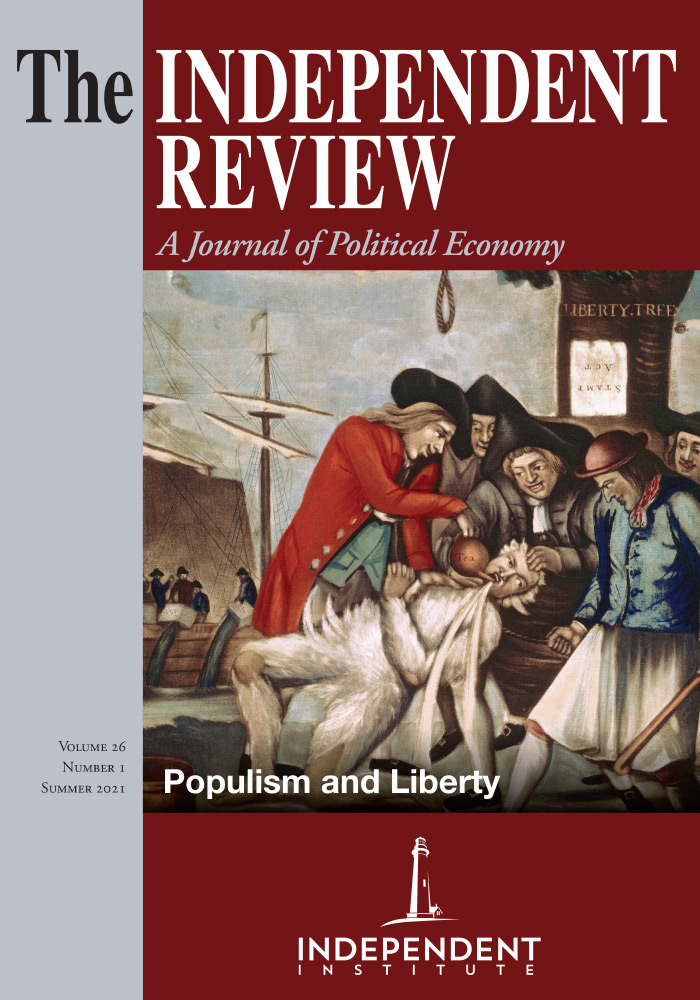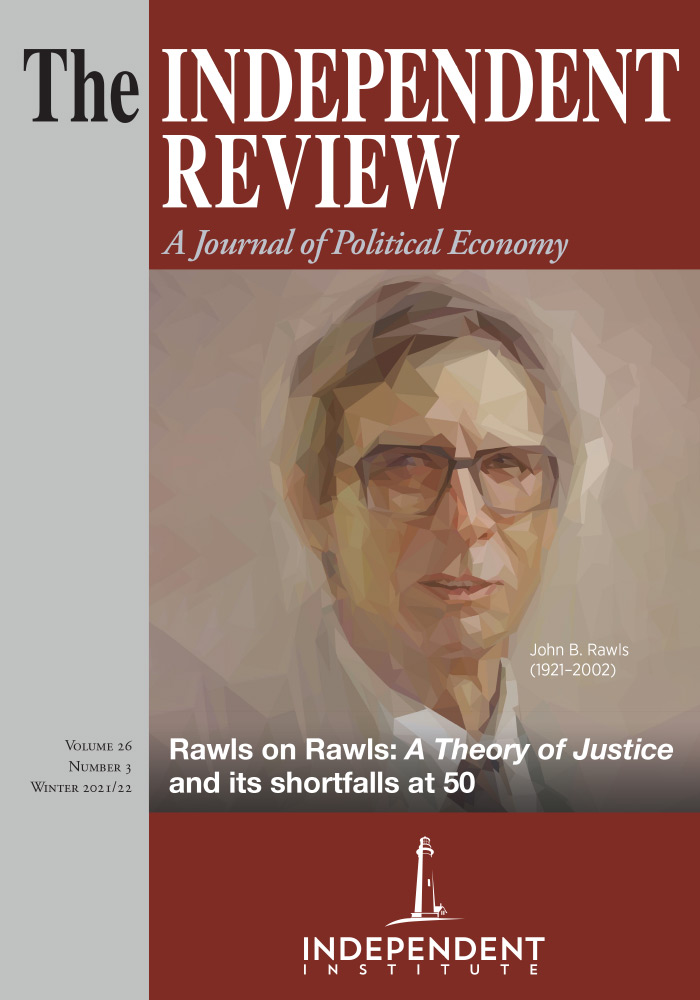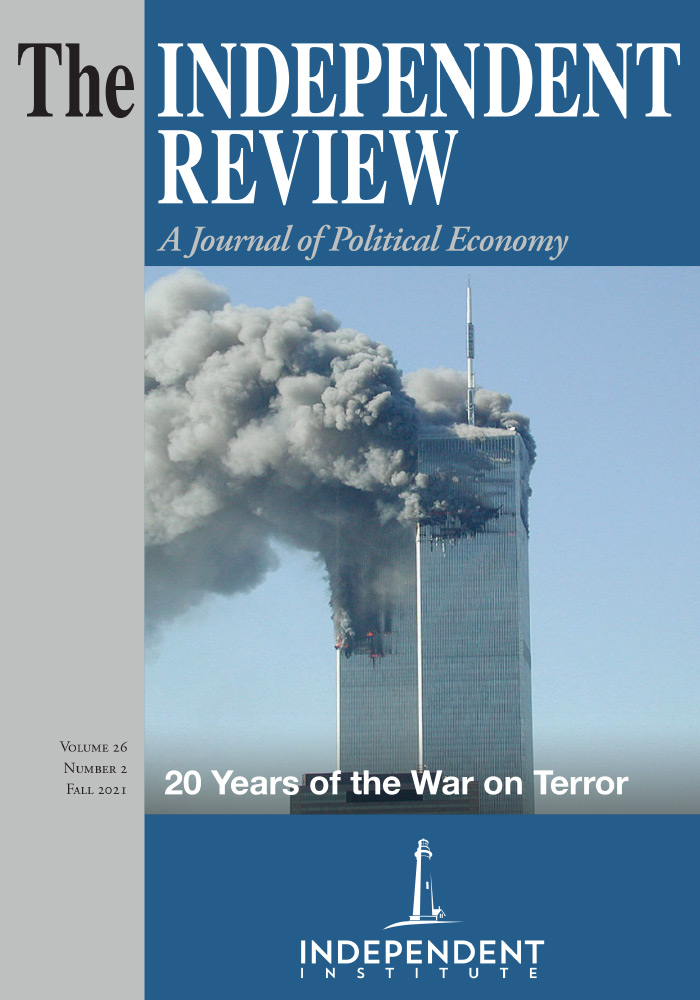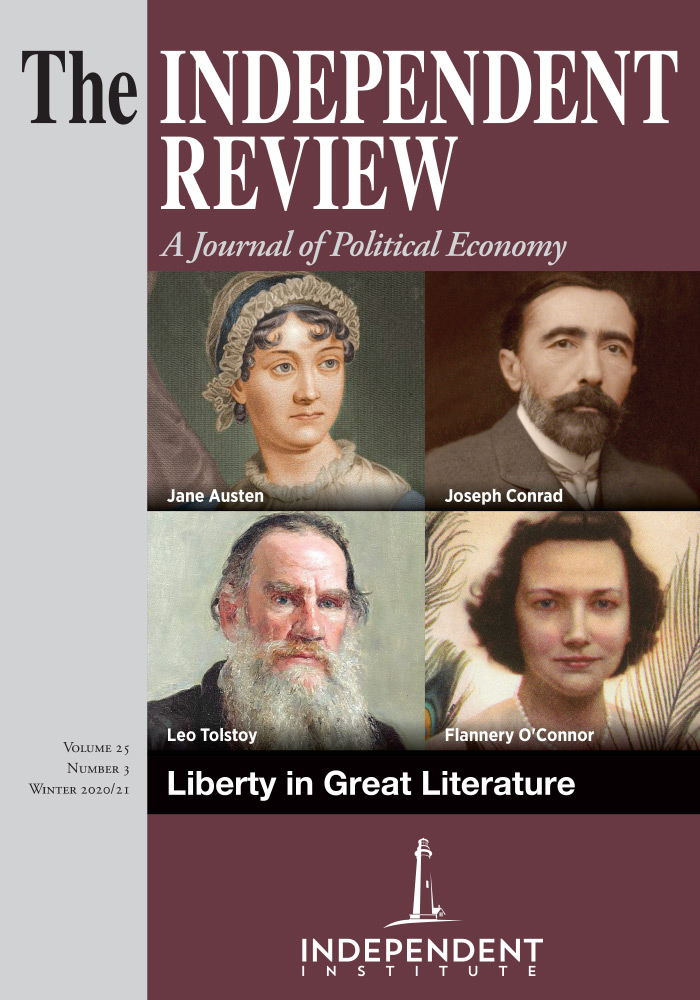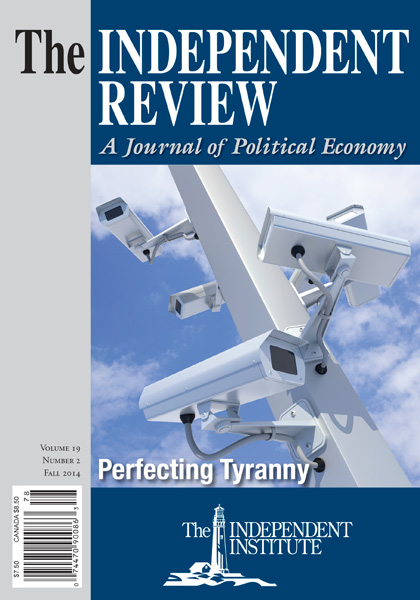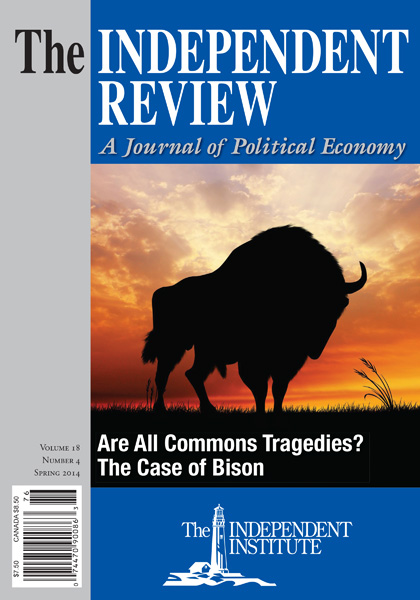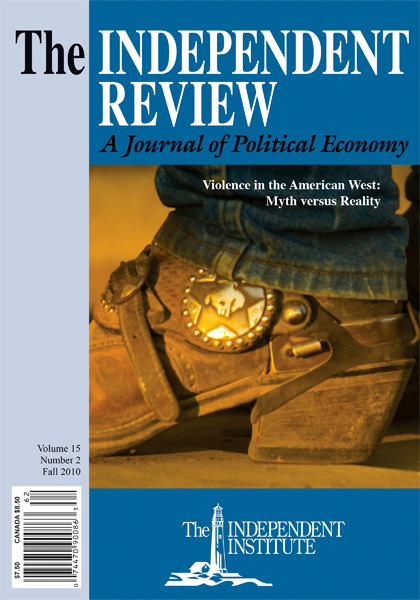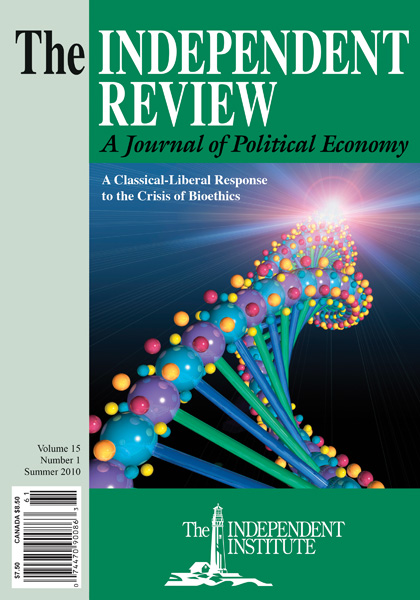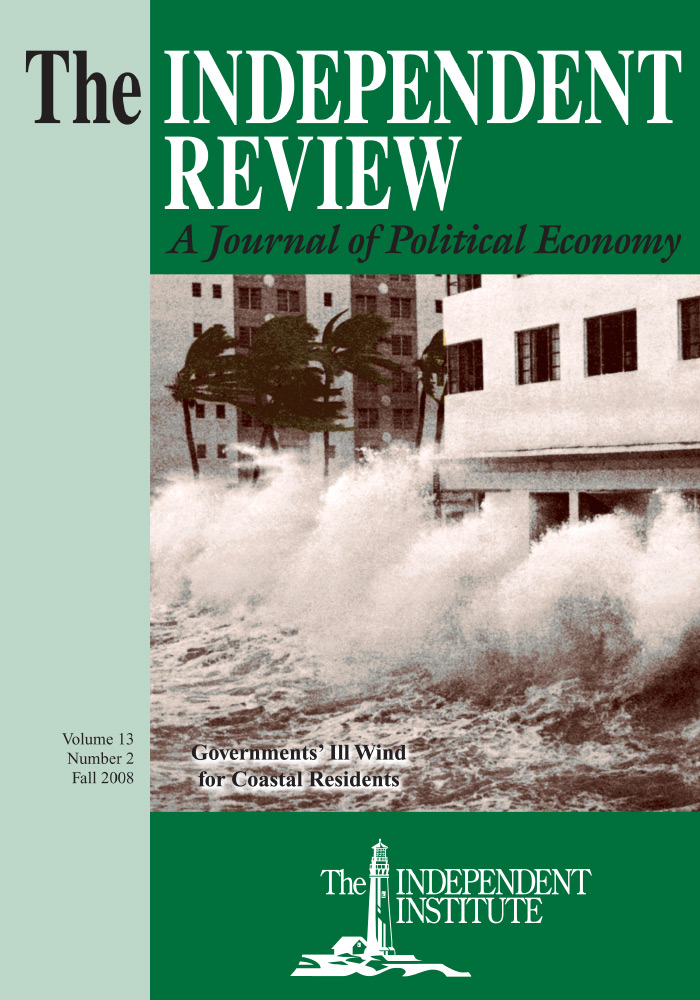This issue of The Independent Review includes nine essays on populism, self-government, and liberty. What is populism? Is it a threat to the republican experiment or is authentic populism the animating spark that will keep our system vital? The problem is that both claims are true: the “bottom up” ability to rise to great challenges and yet fail dismally in everyday management, has always been a characteristic of democracy.
Article
Populist and neoliberal are epithets: anyone who uses one of these terms as a description doesn’t belong to the group being described. The more extreme stand-ins—socialist for the Left and fascist for the Right—are hyperbolic and hackneyed, so populist and neoliberal have become go-to descriptors for ideological smears. On the one hand, progressives have taken increasing umbrage at being called populist, with demands for the term to be excised from the media lexicon: “The word ‘populist’ has no widely agreed-upon definition, but plenty of negative associations. . . . [B]ig media needs [sic] to stop using the word ‘populist’ to describe Democrats’ economic programs and their appeals to voters” (Starkman 2008).
On the other hand, some people on the right cop to being “populists”;[1] clearly, the word’s meaning is in contest (Mudde 2004; Mudde and Rovira Kaltwasser 2017; Norris and Inglehart 2019). As Cas Mudde put it more than fifteen years ago in a prediction that can only be called prescient, “[Because of] structural changes, and the consequent move away from legal authority and toward charismatic authority, as well as the demystification of politics in Western liberal democracies, populism will be a more regular feature of future democratic politics, erupting whenever significant sections of ‘the silent majority’ feels that ‘the elite’ no longer represents them” (2004, 563).
This issue of The Independent Review includes nine essays written in response to a call for papers on “populism, self-government, and liberty (economic and civil).”[2] In selecting among the many submissions, we have tried to give a fair, conceptually grounded account of the history and current status of populism. Much of our focus is on the United States, but we have provided some accounts of populism more broadly. These nine articles give a snapshot of populism that crosses standard political boundaries and tries to make some forecasts about the future.
Some preliminaries are in order. First, as far as I can tell, democracy means “a government that does what I want, which is the right thing to do.” That’s not really very helpful; although such democracy is nearly unanimously popular, it is also meaningless: anyone who opposes me is thwarting democracy. This is precisely the definition that some of my academic colleagues appear to have in mind (as noted in Munger 2017): any restriction on informed majority action is tyranny. Of course, the qualification “informed” is important in that definition because actual empirical majorities might favor restrictions on individual rights such as abortion access or same-sex marriage. These majorities are apparently not to be taken seriously, however, because they disagree with the informed opinions of elites who know what majorities should want.[3]
The origin of the notion of democracy, or rule by the many, as self-evidently good is recent, to say the least. The more standard view of democracy for many centuries was something closer to “mob rule,” as Plato makes clear in book VIII of the Republic:
When a democracy which is thirsting for freedom has evil cupbearers presiding over the feast, and has drunk too deeply of the strong wine of freedom, then, unless her rulers are very amenable and give a plentiful draught, she calls them to account and punishes them, and says that they are cursed oligarchs.
[But] loyal citizens are insultingly termed by her slaves who hug their chains and men of naught; she would have subjects who are like rulers, and rulers who are like subjects. . . . Now, in such a State, can libertyhave any limit? (Plato 1908)
The point of liberty in a society of free and responsible citizens is to reward the responsible component of citizenship. As Montesquieu argues in The Spirit of the Laws (1748), “It is true that, in democracies, the people seem to act as they please; but political liberty does not consist in an unlimited freedom. In governments, that is, in societies directed by laws, liberty can consist only in the power of doing what we ought to will, and in not being constrained to do what we ought not to will” (1989, 150). This view is reflected in the work of David Hume, Adam Smith, Edmund Burke, and Friedrich Hayek: the will of the people is the law, which emerges over time as the set of shared principles of propriety and right action that make behavior self-governing. The law can be instantiated, at least in a just and prudent system of government, by legislation that writes down what is already recognized as being the law. Liberty is then the full power of doing what “we ought to will”; laws that prevent right action or compel wrong action are unjust.
The point is that there is very little reason to expect the evanescent impulses of majorities to correspond to the law. The law is certainly not legislation that robotically encodes the “will of the people,” measured by an election or a vote of the legislature or taken without reference to the principles of the law or the principles of propriety that have been culturally vetted and tested over decades.
Populism, at least in the negative sense in which that term is understood by many (including those on the left who object to the label), is legislation that is based on the unmediated majority of the moment. Republican institutions, which interpose a deliberative legislature, an executive, and a judiciary between majorities and state action, are inherently (and often, to populists, frustratingly) antimajoritarian institutions. This is even more true for a bill of rights, an explicit list of limitations on the domain of state action.
The frustration being expressed depends of course on the momentary majority being thwarted. Populistmovements can form around ideologies of the left or of the right or around no coherent ideology at all. As H. L. Mencken joked in Notes on Democracy ([1927] 1982), “[In the electorate,] one hears, lies a deep, illimitable reservoir of righteousness and wisdom, unpolluted by the corruption of privilege. What baffles statesmen is to be solved by the people, instantly and by a sort of seraphic intuition. . . . The cure for the evils of democracy is more democracy. This notion originated in the poetic fancy of gentlemen on the upper levels— sentimentalists who, observing to their distress that the ass was over-laden, proposed to reform transport by putting him into the cart” (154). What is populism, exactly? Is “American populism” distinctive, or is the core of populism shared across time and space by multiple political movements? And is populism a threat to the American republican experiment, or is some form of authentic populism the animating spark that will keep our system vital and alive? These and other questions are what motivated the authors of our nine essays.
The Essays
We lead off with a piece by Pierre Lemieux, which we have selected as the winner of our third Independent Excellence Prize. Lemieux notes quite rightly that there is a logical contradiction at the heart of populism. This contradiction, as has been pointed out in much of the public-choice movement (Buchanan 1954; Riker 1982) is ontological, not (just) epistemological. That is, the problem of populism is not do what the people command, if you can figure out what that is! That would be a hard problem because information, complex voting procedures, and problems with turnout and participation are daunting. Lemieux’s point is that “the people” does not exist as an independent individual-like or superindividual entity, so that “the will of the people” is not just hard to discover but also cannot be assumed to exist. The problem of Condorcet’s Paradox, generalized by Kenneth Arrow’s “impossibility theorem” (for background, see Munger and Munger 2015, chap. 7), is that there is no single will that can be arrived at by aggregating the preferences of citizens.
It is possible to vote, and an alternative may in fact receive a majority of votes in that context, but many other majorities are context and strategy dependent. To paraphrase Kenneth Shepsle (1992), the people is a “they,” not an “it.” It is possible, of course, to conceive of the project of self-governance of a populace if “the people” are reconceptualized as equal members of a set of separate individuals, each of whom governs herself or himself. But that’s not populism; that’s classical liberalism. Lemieux echoes and extends William Riker’s (1982) conclusion that the means of purely majoritarian democracy, or populism, are simply inconsistent with its ends. Populists want rule by the people, but majoritarianism without constraining institutions always leads to a Napoleon or to chaos.
Randall Holcombe extends the idea that populist means are inconsistent with the supposed ends of populism. He notes that the shared component of populist movements, left or right, is the claimthat government should be accountable to the masses rather than controlled by elites and that in fact policies should be explicitly designed to benefit the masses. Holcombe’s argument is institutional rather than normative or based on social choice problems. The institutions of government, because of the problems of collective action, rational ignorance, and abstention of voters, have a strong tendency toward elite dominance. Paradoxically, then, institutions of markets, which many think are “designed” to benefit capital and the powerful, are actually better suited for serving the masses than are political systems. Most individuals and, for that matter, many groups of individuals have no meaningful political power and no reason to learn much about policies. But then, Holcombe asks, why would a system based on power protect the weak?
Bruce Frohnen (perhaps unsurprisingly for those of us who have admired his work presenting and interpreting the documents of the American founding) focuses on the structure of American government and the nature of constitutional protections of rule by the people. He argues that populism is the normative defense of rule by and for the common people. The problem is balancing the “by” and the “for”; American constitutionalism was forged in response to the problem of preserving ordered liberty in a democratic society. Frohnen argues that this great American republican experiment succeeded until (relatively) recently. Importantly, a populist, self-governing spirit was essential to maintaining this constitutional system of ordered liberty precisely because it lent itself to forbearance by those in power. Laws and rules alone cannot permanently protect deference to states in a federal system or separation of power in a national system. Citizens have to believe in that system and to deny attempts to concentrate power, even (perhaps especially) when the elites proposing concentration promise to use the power for good. Functional populism thus requires an independent citizenry steeped in faith, family, and local freedom. The corruption of these values by a managerial elite, in Frohnen’s view, has destroyed much of the sturdy independence defining Americans’ relation to their government. As a result, the newly empowered populist movements, on the left and the right, have come unmoored from the cultural assets that made American populism a force for good. The question is whether American constitutionalism itself can survive in the new, more hostile environment.
The paper contributed by the philosopher John Thrasher focuses on meanings and relations among three distinct but interrelated notions or forms of populism. The first is a theoretical claim, which holds that the only legitimate political order is one that directly represents the will of the people through legislation and political leadership. The second goes further, animating the “will of the people” to weaken political elites and insiders in the inherent belief that such power is always inimical to the public good. Finally, the third form of populismde-emphasizes (but does not ignore) politics in favor of concerns for culture. Populism in the cultural realm privileges accessibility and mass appeal over sophistication and refinement to the extent that it may appear to be antiintellectual and to exalt the naive or primitive origin myths. In Thrasher’s view, the third is the most benign form of populism and is particularly characteristic of many American cultural forms. But all three forms of populism can be excessively deployed and represent a danger to liberty, a threat to undermine democracy, and (as Alexis de Tocqueville [2002] noted in 1835) a threat that operates through pressures of social conformity.
William Watkins extends Riker’s (1982) examination of populism as the modern version of Rousseau’s “general will” and reprises the argument for why elections should be thought of as a means of controlling bad officials, not for discovering transcendent truths. Watkins questions, however, whether even Riker’s tepid endorsement of voting is justified. The unforeseen difficulty of the rise of the managerial class, embedded in an administrative state, expands the degree of subjugation of the populace. So although “populism” may indeed be a problem in its “general will” form, recourse against the concentrated power of the administrative state may in fact prove of value to the public. Watkins would argue that the rise of the administrative state and the principles of popular sovereignty suggest the desirability of a new “constitutional populism” whereby the people have an opportunity to truly check tyranny.
Or perhaps this type of populism is not all that new: a version of this capacity for popular nullification was interwoven throughout the first seventy-five years, at least, of the life of the American republic. Although not endorsing the motives of John C. Calhoun (who in my view was seeking to protect slavery), Watkins argues that Calhoun’s (1992) argument anticipated the danger of the population losing control of the state apparatus. According to Watkins, Calhoun saw that the basis for the doctrine of nullification was the locus of sovereignty, meaning that citizens of the states had veto power over actions by the federal government, in effect limiting the power of the center. In short, then, with the rise of a permanent administrative apparatus, there is no longer any mechanism by which voting or popular elections can effectively remove a government that citizens despise. Watkins proposes nullification as a work-around, one that he sees as in keeping with the logic of American federalism but not with its current practice.
Richard Adelstein defines populism as political movements animated by a hostile alienation of “the people” from the institutions of government because members of the populist movement have come to see state institutions as being run by a corrupt and selfperpetuating elite. He distinguishes two varieties: (1) reform populism, in which populists are brought emotionally and politically into the governing institutions; and (2) revolutionary populism, in which the populists separate to form a new government or try to use revolutionary tactics to bring down the existing institutions in hopes of replacing them with more responsive organs. In his view, one of the key problems of American government through the eras of expansion and the Civil War, through Reconstruction, the Progressive Era, and beyond, has been the eternal struggle to channel populist energy—the wellspring of which is inexhaustible!—into reform directions rather than into revolution. Adelstein then takes an interesting turn and reexamines the positions of the Federalists and Antifederalists in the confrontation over large versus small republics in the constitutional debates of 1787. He concludes by examining in particular Thomas Jefferson’s notion of the need to foster developmental liberty in decentralized institutions in light of this debate.
Johan Wennström brings in a broader perspective, considering some of the origins of populism that remind the reader about the origins and evolution of liberalism (in the European sense of broad classical liberalism). He claims that the convergence and near consensus of the “mainstream” left and right parties around the core notions of liberalism—the moral foundations of care, fairness, and liberty—are actually the most likely explanations of populist discontent. He explains this paradox by noting that the expectation of consensus on these norms has caused establishment politicians and parties to lose touch with moral pluralism and with the conservative moral intuitions intimately bound up with religion and tradition. This is a paradox because a metapremise of liberalism was the acceptance of difference in moral intuitions in the populace of citizens. The particular “case” Wennström focuses on is what he sees as the moral consensus, including a near-total convergence, of two Swedish establishment parties on immigration and education policy: the left-wing Social Democrat Party and the rightwing Moderate Party. Wennström argues that in order to win back wide public support and to forestall the rapid growth of “extremist” parties, disagreement and discussion focusing on education and immigration will have to be given social and cultural license rather than being closed off by social pressure and political practice.
Jennifer Brick Murtazashvili, Ilia Murtazashvili, and Tymofiy Mylovanov consider populism through the lens of Trumpism between 2016 and 2021. Both Donald Trump’s election in 2016 and his failure to win reelection in 2020 roiled the already troubled waters of American politics. But things might not be as bad as they seem, according to these authors, and the concerns that we stand on the brink of civil war, fascist revolt, and the destruction of democratic institutions are at worst premature. These authors argue that American institutions are exceptionally robust precisely because both separation of powers in law and federalism in election administration make it so difficult to consolidate power. Trump’s illiberalism might be business as usual in an actual majoritarian democracy, but the United States is a complex constitutional republic, and so much of the force for populist revolution is diffused and ultimately defused. Murtazashvili, Murtazashvili, and Mylovanov point to three thinkers—James Buchanan, William Riker, and W. H. Hutt—as having outlined the function and importance of such institutional constraints on majoritarianism. They claim that Trump actually did little to expand the institutional authority of the presidency and made a number of rhetorical claims that ultimately didn’t amount to much. They then list the institutional constraints, relying in part on the outline adumbrated by Vincent Ostrom, that ultimately functioned well in limiting the adoption and implementation of illiberal policies. These authors offer not so much a criticism of Trump as an illustration of the values of effective controls on majoritarian or executive excess. They claim that the central lesson of Trump’s tenure as president has been the control of momentary majorities in a way that the American Founders intended even if they could not directly foresee the circumstances in which the rules would be put to the test.
The final paper in our symposium is contributed by Jeffrey Carroll. He begins with the oddity that the term populism is pejorative yet is broad enough that it is used to denigrate both Donald Trump and Bernie Sanders, two candidates for president in 2020 who shared very little in terms of policy goals. But, of course, the notion that populism can be dangerous is much older; Riker’s (1982) juxtaposition of populism and liberalism simply resurrects a contention that dates to at least the Federalist versus Antifederalist debates of the eighteenth century, which have in some ways been with us ever since. As Carroll notes, Riker is clear that he thinks populism is the enemy, but it is useful to work some more to identify just who this enemy is. Carroll offers a more careful conceptual analysis of populism, using the results to assess Riker’s argument that liberalism and populismmust be opposite ends of a continuum. Carroll is not so sure; he offers an alternative way of thinking of the problem based on consent and contractarianism. Specifically, suppose that populist institutions were in fact based on the contractarian consensus, requiring full unanimity. Carroll admits that this usage of full consensus is not the way “populism” is usually understood, but it is an interesting way of reconciling two alternatives, liberalism and populism, that have often been categorized as mutually exclusive and antagonistic.
For my own part, I found reading and assessing the papers contributed to this symposium to be intellectually stimulating and a reminder that many questions seem simple but are by no means easy to answer. Populism is an aspect of democratic governance whose importance waxes and wanes, something that most of us recognize needs to be controlled and channeled, but also something that cannot be eliminated without far greater harms being imposed on the political system. This dualism, an ability to rise to great challenges and yet fail dismally in everyday management, has always been characteristic of democracy.
I suppose it is of some solace to remember that it has ever been thus. Writing around 140 B.C., the Greek historian Polybius had these observations about politics:
The Athenian [democracy] is always in the position of a ship without a commander. In such a ship, if fear of the enemy, or the occurrence of a storm induce the crew to be of one mind and to obey the helmsman, everything goes well; but if they recover from this fear, and begin to treat their officers with contempt, and to quarrel with each other because they are no longer all of one mind,—one party wishing to continue the voyage, and the other urging the steersman to bring the ship to anchor; some letting out the sheets, and others hauling them in, and ordering the sails to be furled,—their discord and quarrels make a sorry show to lookers on; and the position of affairs is full of risk to those on board engaged on the same voyage; and the result has often been that, after escaping the dangers of the widest seas, and the most violent storms, they wreck their ship in harbour and close to shore. (1889, book VI, chap. 44)
The democracies of the world have indeed over the past 150 years often worked together and escaped the dangers of the wildest seas. But it has been hard to watch as we often wreck our own ships of state on populist shoals, in harbor and close to shore. I hope you find this symposium of use in thinking about some reasons why this may be true.
Notes
[1] “Populism precisely is taking into account the people’s opinion. Have people the right, in a democracy, to hold an opinion? If that is the case, then yes, I am a populist” (Jean-Marie Le Pen, quoted in Stanley 2008, 97). The Independent Review, v. 26, n. 1, Summer 2021, ISSN 1086–1653, Copyright 2021, pp. 5–13.
[2] See the call for submissions at www.independent.org/publications/tir/independent_excellence_prize.asp.
[3] As Genevieve Lakier (2021) notes, conservatives have recently joined the chorus of calls for regulation of private-speech platforms. In 2020, Twitter, Facebook, and other social media apps restricted content based on what the platform operators considered to be false statements. As a result, a number of conservatives claimed the election was "stolen," and not just because the results were tampered with. The claim was that the supposed majorities were not informed, because of the bias of Silicon Valley elites in decided what speech to allow on social media.
References
Buchanan, James M. 1954. Social Choice, Democracy, and Free Markets. Journal of Political Economy 62, no. 2: 114–23.
Buffalo Springfield. 1967. For What It’s Worth. On Buffalo Springfield. Atco Records.
Calhoun, John C. 1992. The Political Philosophy of John C. Calhoun. Edited by Ross M. Lence. Indianapolis, Ind.: Liberty Fund.
Lakier, Genevieve. 2021. The Great Free-Speech Reversal. Atlantic, January 27.
Mencken, H. L. [1927] 1982. Notes on Democracy. Reprinted in A Mencken Chrestomathy, 154–68. New York: Vintage Books.
Montesquieu, Charles de Secondat, Baron de. 1989. The Spirit of the Laws. Translated by Anne M. Cohler, Basia Carolyn Miller, and Harold Samuel Stone. Cambridge, U.K.: Cambridge University Press. Originally published in French in 1748.
Mudde, Cas. 2004. The Populist Zeitgeist. Government and Opposition 39, no. 4: 541–63.
Mudde, Cas, and Cristóbal Rovira Kaltwasser. 2017. Populism: A Very Short Introduction. Oxford: Oxford University Press.
Munger, Michael C. 2017. On the Origins and Goals of Public Choice: Constitutional Conspiracy? The Independent Review 22, no. 3 (Winter): 359–82.
Munger, Michael C., and Kevin M. Munger. 2015. Choosing in Groups: Analytical Politics Revisited. New York: Cambridge University Press.
Norris, Pippa, and Ronald Inglehart. 2019. Cultural Backlash: Trump, Brexit, and Authoritarian Populism. New York: Cambridge University Press.
Plato. 1908. The Republic. Translated by Benjamin Jowett. Internet Classics Archive.
Polybius. 1889. Histories. Translated by Evelyn S. Shuckburgh. New York: MacMillan.
Riker, William H. 1982. Liberalism against Populism: A Confrontation between the Theory of Democracy and the Theory of Social Choice. San Francisco: Freeman.
Shepsle, Kenneth A. 1992. Congress Is a “They,” Not an “It”: Legislative Intent as Oxymoron. International Review of Law and Economics 239, no. 12: 240–48.
Starkman, Dean. 2008. Popular? Must Be “Populist”: Why Does the Press Use “Populist” to Refer to Policies That Are Simply Liberal? Columbia Journalism Review, February 20.
Stanley, Ben. 2008. The Thin Ideology of Populism. Journal of Political Ideologies 13, no. 1: 95–110.
Tocqueville, Alexis de. 2002. Democracy in America. Translated by Harvey C. Mansfield and Delba Winthrop. Chicago: University of Chicago Press. Originally published in French in 1835.
| Other Independent Review articles by Michael C. Munger | ||
| Fall 2024 | Tax Turmoil: A Dia Fenner Economic Thriller | |
| Fall 2024 | Retrieving Liberalism from Rationalist Constructivism, Volume I; Retrieving Liberalism from Rationalist Constructivism, Volume II | |
| Fall 2024 | The Dispersion of Power: A Critical Realist Theory of Democracy | |
| [View All (83)] | ||

